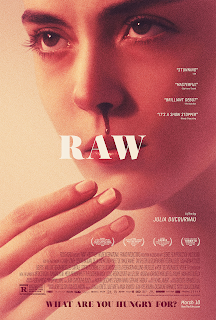(SPOILER ALERT)
I was having trouble deciding whether to watch this brilliant Danish horror film, because I couldn't tell if it was sub-titled, or dubbed. Full disclosure, I am a bit of a snob when it comes to dubbing, and, in the words of the great Laemmle Twin arthouse theater in Los Angeles, I am "not afraid of subtitles". Turns out, that is one of the things that makes this film so effective: the two couples are from two different countries -- Holland and Denmark -- and, since neither speaks the other's native language, they communicate almost entirely in English.
And therein, as Hamlet would say, lies the "rub". Miscommunication lies at the heart of the story here, or, at least, if one couple understood better what the other was saying they might have not only extricated themselves, and their daughter, from a fate literally worse than death, but might have also avoided the somewhat horrifying social awkwardness that almost steals the show, here.
A couple from Denmark are vacationing with their daughter in Tuscany, and meet another couple (with an odd son) from Holland who are staying at the same Pensione or Villa. Really, things start going "bad" from the very beginning, as the Holland couple are just strange, and their son is unable to speak properly due to a tongue having been malformed (or cut out?). As one reviewer pointed out, the lengths to which the Danish couple will go to accommodate -- that is not embarrass themselves socially -- the weird Holland couple provides a horrifying reality that nearly overshadows the truly gruesome nature of the "big reveal" in the end.
For example, after being invited to stay the weekend with the Holland couple, upon their return, the Danish couple feel like they can't refuse. They say to one another, "how bad could it be?" Turns out, very bad. After making their way over eight hours by car (and Car Ferry) to the Holland couple's low-rent house in the Dutch woods, they are subjected to various social affronts, including having to watch the Holland couple do a very sexual dance in a sketchy Roadhouse (like something out of a Tobe Hooper or Rob Zombie flick), and having the Danish wife experience the other couple's husband doing "number one" in the bathroom while she is taking a shower.
The plotting of Speak no Evil is so effective that, about halfway through the film, enough is enough and the Danes escape at dawn, only to return to retrieve their daughter's seemingly lost stuffed bunny. This is the classic horror movie trope where the protagonists go toward the axe-wielding villain, not away. Here, awakened, the Holland couple confronts them and puts social pressure on them to stay. Uh, oh.
From here things go downhill fast. That night the Danish father discovers a cabin where the souvenirs from previous victims -- cameras, camping equipment -- are hanging like trophies, and then comes across the Holland couple's son, Abel floating dead upside down in a hot tub. It all becomes very clear, very quickly that the Hollands are a serial killer couple, who maim and kidnap other couples' kids, and kill the adults. Within only a few minutes of the film's elapsed time, their daughter is seized and mutilated by a mysterious third stranger, and the couple are stoned to death in a lonely quarry. That's it, end of story.
Or is it? The last scene has the Holland couple, now with the dead Danish couple's tongueless daughter driving up a hill to a classic Italian villa, searching for their next victim.
Yikes.













.jpg)
